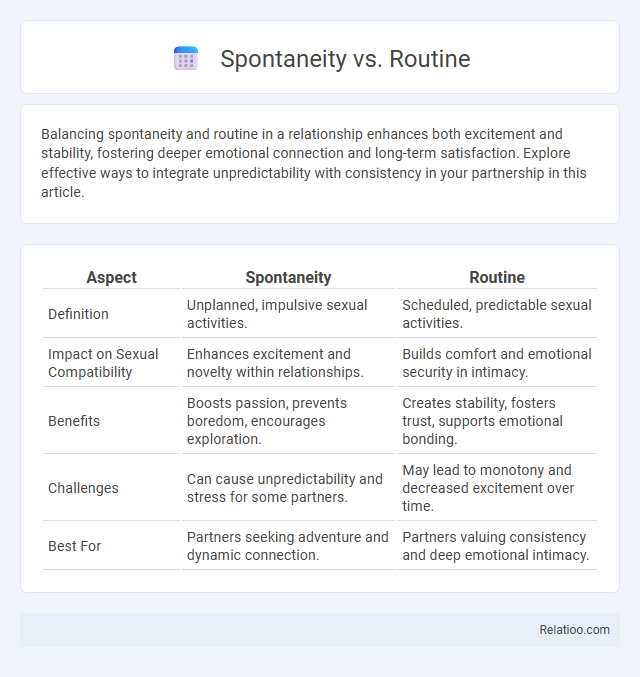Balancing spontaneity and routine in a relationship enhances both excitement and stability, fostering deeper emotional connection and long-term satisfaction. Explore effective ways to integrate unpredictability with consistency in your partnership in this article.
Table of Comparison
| Aspect | Spontaneity | Routine |
|---|---|---|
| Definition | Unplanned, impulsive sexual activities. | Scheduled, predictable sexual activities. |
| Impact on Sexual Compatibility | Enhances excitement and novelty within relationships. | Builds comfort and emotional security in intimacy. |
| Benefits | Boosts passion, prevents boredom, encourages exploration. | Creates stability, fosters trust, supports emotional bonding. |
| Challenges | Can cause unpredictability and stress for some partners. | May lead to monotony and decreased excitement over time. |
| Best For | Partners seeking adventure and dynamic connection. | Partners valuing consistency and deep emotional intimacy. |
Understanding Spontaneity and Routine
Spontaneity injects excitement and unpredictability into Your life, breaking the monotony of routine while fostering creativity and emotional connection. Routine, on the other hand, provides structure, stability, and efficient time management, essential for maintaining productivity and reducing stress. Understanding the balance between spontaneity and routine helps prevent turn-offs caused by boredom or chaos, enhancing overall well-being and relationship satisfaction.
The Psychology Behind Spontaneous Actions
Spontaneous actions engage the brain's reward system, releasing dopamine that enhances feelings of pleasure and excitement, contrasting with the predictability of routine behaviors. Your brain craves novelty, and spontaneity breaks monotony, stimulating creativity and emotional connection, which can prevent emotional turn-offs caused by boredom or predictability. Understanding this psychological interplay helps explain why balancing spontaneity and routine is essential for maintaining motivation and relationship satisfaction.
The Science of Habit and Routine
The science of habit reveals that routines create neural pathways in the brain, making behaviors automatic and energy-efficient, while spontaneity engages the brain's reward system by triggering dopamine release and promoting creativity. Your brain thrives on a balance: routines provide stability and reduce cognitive load, but too much predictability can lead to monotony and decrease motivation, creating a turn-off effect. Integrating spontaneous actions within habitual patterns can optimize mental health and enhance overall life satisfaction by stimulating novelty without sacrificing structure.
Benefits of Embracing Spontaneity
Embracing spontaneity enhances creativity and reduces stress by encouraging you to break free from rigid routines and experience life with fresh perspectives. This approach fosters adaptability, making it easier to navigate unexpected situations and cultivate a more fulfilling and dynamic lifestyle. Incorporating spontaneous moments into your daily life can renew motivation and deepen connections by prioritizing authentic, unscripted interactions.
Advantages of Following a Routine
Following a routine enhances productivity by creating consistent habits that improve focus and efficiency throughout your day. Structured schedules reduce decision fatigue, allowing you to dedicate more mental energy to important tasks and personal goals. Your ability to manage time effectively increases, leading to reduced stress and greater overall well-being.
Challenges of a Spontaneous Lifestyle
A spontaneous lifestyle often faces challenges such as unpredictability in daily plans, which can lead to stress and difficulty managing time effectively. Without consistent routines, maintaining long-term goals and responsibilities becomes harder, increasing the risk of burnout and decreased productivity. The turn-off for many is the lack of stability, as constant change can hinder mental well-being and disrupt social commitments.
Drawbacks of Rigid Routines
Rigid routines can stifle creativity and reduce adaptability, leading to decreased motivation and increased stress levels over time. The lack of spontaneity often results in boredom and a diminished sense of fulfillment, negatively impacting mental health and overall well-being. This inflexibility may also hinder problem-solving skills and limit opportunities for personal growth and meaningful experiences.
Striking the Balance: Mixing Spontaneity and Routine
Striking the balance between spontaneity and routine enhances personal well-being and productivity by combining the excitement of new experiences with the stability of established habits. Integrating unpredictable activities into daily schedules boosts creativity and reduces stress, while consistent routines maintain structure and efficiency. Finding this equilibrium prevents monotony and burnout, fostering a dynamic yet grounded lifestyle.
Spontaneity vs Routine in Personal Growth
Balancing spontaneity and routine significantly impacts your personal growth by fostering adaptability and stability simultaneously. Spontaneity encourages creativity, problem-solving, and openness to new experiences, while routine builds discipline, consistency, and efficient habit formation. Integrating both elements supports emotional resilience and continuous self-improvement, avoiding stagnation and burnout.
Practical Tips for Finding Your Ideal Balance
Finding your ideal balance between spontaneity, routine, and turn-offs involves assessing personal energy levels and daily obligations to customize flexible schedules that allow room for unexpected adventures while maintaining necessary structure. Practical tips include setting time blocks for unplanned activities, establishing non-negotiable routines around sleep and wellness, and identifying triggers that cause frustration or disengagement to minimize turn-offs effectively. Utilizing apps that track habits and mood patterns can provide data-driven insights to fine-tune this balance for sustained productivity and well-being.

Infographic: Spontaneity vs Routine
 relatioo.com
relatioo.com